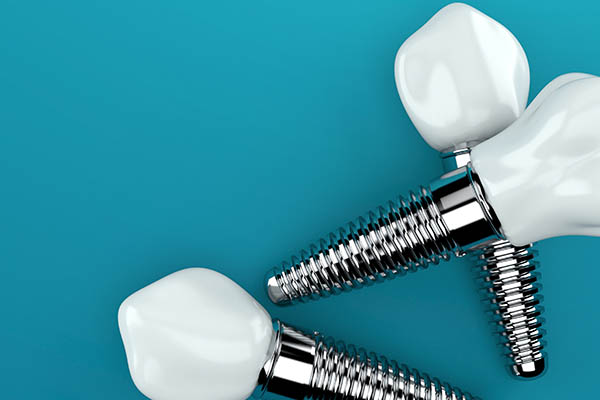Can Dental Implants Replace Multiple Teeth?

Getting dental implants is a popular way to replace missing teeth. These oral prosthetics replace lost teeth roots and are designed to last a lifetime.
Implants can be used to replace one or more teeth. Crowns, dentures, or bridges are attached to the implants, depending on the patient’s needs.
Replacing multiple teeth with dental implants
No other oral prosthetic used to replace missing teeth comes close to implants regarding their similarity to natural teeth. Implants also do not require any special care, so people who replace their missing teeth with implants can return to their regular routines. That is a significant contrast to other missing teeth replacement options, like dentures, which need to be cleaned and soaked daily.
People with multiple missing teeth can replace each tooth with an implant, but that can quickly become pricey. Getting dental implants is the most expensive way to replace missing teeth, and many people cannot afford to have all their missing teeth replaced with implants.
Fortunately, dentists can lower costs by combining implants with restorations like dentures and bridges. This leads to significant savings because dentists can often replace an entire dental arch of teeth using only four to six implants, which serve as bases for restorations like dentures.
This way, patients still get the benefits of replacing missing teeth with implants, including the bone tissues in their jaw getting the stimulation that they need to stay healthy. Most implant-supported missing teeth replacement options do not have any special maintenance requirements.
The process
Replacing multiple missing teeth with implants starts with the dentist evaluating the patient to determine if they are healthy enough to proceed. This includes going over the patient’s medical and dental history to verify that they do not have any existing issues that could complicate the recovery process.
The dentist will also talk to the patient about any medications that they are taking. Certain drugs, like blood thinners, hinder a person’s ability to heal. Recreational drugs like alcohol and tobacco also increase the risk of complications. Anyone who wants to replace their teeth with implants should be willing to give up such habits, at least temporarily.
The patient’s jawbone is examined to determine if it is thick enough for implants. Bone grafts might be needed otherwise. This can add an extra three months to the process because patients need to be fully healed before implants can be placed in their jaw.
During the surgical installation of the implant, the patient is injected with a local anesthetic before the dentist cuts into their gum tissue to reach their jaw. Holes are then drilled, in which the implants are carefully placed. Temporary artificial teeth might be attached to the implants to end the first part of the treatment.
The patient returns in about six months, once the implants have fused with jawbone tissues. The temporary teeth are removed and replaced with the customized teeth.
Frequently asked questions about dental implants
Let us go over the answers to questions that patients might have regarding dental implants.
1. How do implants preserve bone tissues in the jaw?
Implants are the only teeth replacement options that prevent the bone tissue loss that takes place when teeth fall out. That is the primary purpose of an implant. It replaces the roots that came out with the lost tooth. A cosmetic restoration like a crown is attached to it to replace the tooth's visible part.
Bone tissues need to be constantly stimulated to remain healthy, just as is the case with muscle tissues. Teeth roots keep the jaw stimulated by transferring bite forces into it. The stimulation stops when teeth fall out. Implants help keep the jaw stimulated by performing the same role as natural teeth roots. They also serve as bases for dental restorations that are used to replace the visible parts of teeth.
2. Can anyone get implants?
No. Patients need to meet a few criteria to qualify for implants. For one thing, they should be healthy enough to recover from a surgical procedure. Certain health issues, like blood-clotting problems, immune system disorders, or diabetes, can hinder the body's ability to heal. Jawbone thickness is also examined to determine if it can hold implants in place.
3. How long do implants last?
Implants can last a lifetime when appropriately maintained with good oral hygiene and biannual trips to the dentist.
Replace multiple teeth with implants
Give us a call or stop by our Stoughton clinic to learn more about how our dentist can replace multiple missing teeth with implants.
Request an appointment here: https://dentistryonpark.com or call Dentistry on Park, LLC at (781) 443-8131 for an appointment in our Stoughton office.
Check out what others are saying about our dental services on Yelp: Dental Implants in Stoughton, MA.
Recent Posts
It is a huge decision to get dental implants. The surgery will result in a permanent dental restoration. Understanding each step is important. Doing so can help you prepare for your coming implant placement. If you want to know what the placement of surgical dental implants entails, here is the procedure.Finding the right dentist is…
If you have ever critically damaged or lost a tooth and had it repaired, you probably had a dental implant set. A dental implant is a metal fixture installed by a dentist that fuses to the jawbone via a process called osseointegration. This allows for artificial teeth to be securely placed on top of it.…
Dental implant crowns are the most visible part of the device. These tooth-shaped caps are the top part of the implant, and therefore the most exposed. Although crowns are sturdy, they are not meant to withstand extreme circumstances, such as severe wear, trauma or teeth grinding. For this reason, most dental implant crowns only last…
When a person has missing teeth, it is likely that they will begin to consider their replacement options, such as a dental implant restoration. Implant dentistry has become more and more popular for patients in need of restorative care.If you are considering different dental implant restoration options, then you may find the following information to…


